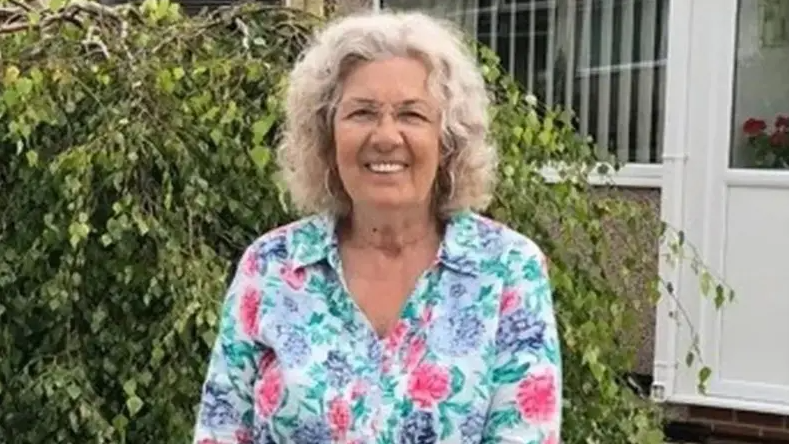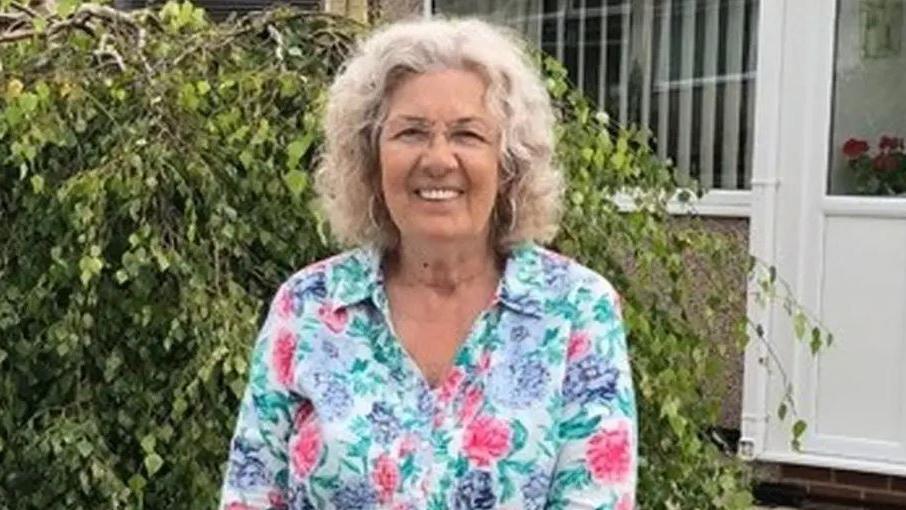Stroke 'played no part' in hospital patient death

Valerie Kneale died at Blackpool Victoria Hospital four days after she was admitted having suffered a stroke
- Published
A stroke played no part in the death of a patient who was subjected to a "forcible sexual assault" after her hospital admission, an inquest has heard.
Valerie Kneale, 75, was admitted to Blackpool Victoria Hospital on 12 November 2018 after she fell ill at her home in Poulton-le-Fylde, Lancashire.
The pathologist who carried out Mrs Kneale's post-mortem examination said her injuries were so unusual they were akin to those suffered in a road traffic accident, and concerns should have been promptly raised.
Blackpool coroner's court heard so much blood had come from Valerie Kneale's body shortly after her death that it had soaked the mattress and was unlike anything staff members had seen before.
The court was told that while Mrs Kneale had been moved to the stroke ward after a scan revealed bleeding in her brain, she was lucid and "chatty" when her family left her just before midnight.
Her relatives were called back to the hospital the next morning after "a marked deterioration" in her condition and it was agreed that Mrs Kneale would be placed on end-of-life care.
The court heard it was initially thought that the stroke had been responsible for her worsening condition.
Mrs Kneale's family stayed at her bedside until she died on 16 November.
Lancashire Police only decided to examine her death after they were called in later that month to investigate allegations of mistreatment and neglect on the ward.
A post-mortem examination, carried out 18 days after her death, concluded Mrs Kneale died not because of her stroke but due to a "forcible sexual assault" inflicted while she was a patient at the hospital.

Police decided to investigate allegations of mistreatment and neglect on the ward at the hospital
Consultant forensic pathologist Dr Alison Armour told the hearing at Blackpool Town Hall she did not regard the stroke as a contributory factor to Mrs Kneale's death.
She said she thought the 75-year-old "would have survived for some time" but for the "serious injury" that had been inflicted during the sexual assault.
The injuries were suffered at least two days before Mrs Kneale died, Dr Armour said, and the "window of opportunity" for the attack included the overnight shift of 12-13 November - the only time Mrs Kneale was not surrounded by family.
Earlier this week, the inquest has heard that three healthcare assistants identified "extensive and significant blood loss" from Mrs Kneale when they prepared her body to be transferred to the hospital mortuary on 16 November.
Mrs Kneale had not previously shown any other signs of blood loss during her hospital stay, the court heard.
One of the healthcare assistants described "blood everywhere" on the bedsheets, which had soaked through to the mattress.
An "overpowering and unusual smell" was also noticeable, the court was told, and a body bag was required.
'Significant delay'
Dr Armour said: "I have never heard a description like that."
She said she thought the bleeding had been present for some time but may not have been visible due to clotting.
Healthcare assistant David Henderson told the court he had gone to the ward clerk to ask for a body bag and that the matter was reported to a nurse, Sister Tracey Brown.
He told coroner Alan Wilson that he "would definitely have stated" why the body bag was needed, but when it was put to him that he might have underplayed the gravity of the situation, he agreed: "That's fair".
Ms Brown did not visit the room and later told the inquest that she did not remember any request for a body bag.
The coroner asked her if she had had any knowledge of what was happening "just a few feet away from you... this lady's cleaned up, put in a body bag, taken to the mortuary and no one's flagged it up to you to any sort of degree?"
She replied that nothing had been flagged to her and if it had been she would have told them to stop and sought medical advice from a doctor.
The inquest heard that another nurse, Matthew Pover, had been approached by the third healthcare assistant in the room, Victoria Holehouse.
In an earlier police statement Ms Holehouse, who no longer works for the trust, said: "I told him that blood was coming out of the patient... he was busy and didn't come into the room to have a look. I cannot remember anyone else coming into the room to look at Valerie."
Mr Pover has previously testified that Ms Holehouse had not appeared "overly upset" when she came to him and so he did not appreciate the urgency, although he now thought he had underestimated the seriousness of the situation.
'Murder investigation concluded'
Dr Armour said failure to formally raise concerns about Mrs Kneale's bleeding was a "serious and significant clinical omission" following her death.
She said an "adverse incident form", which would have flagged a concern, should have been filled in on the day the patient died.
Earlier this week, retired senior investigating officer Det Ch Insp Jill Riley said the failure had led to a "significant delay" in securing and preserving critical evidence.
By the time the post-mortem examination findings came back, Mrs Kneale's room would have been cleaned and used by other patients, she said.
Clothing the patient wore at the time of her death had also been disposed of by hospital staff.
The delay also meant CCTV footage was not preserved.
Det Ch Insp Riley said the murder investigation had concluded with "all possible lines of inquiry" failing to identify who may have been responsible for attacking Mrs Kneale.
The inquest is expected to conclude on Thursday.
Get in touch
Tell us which stories we should cover in Lancashire
Listen to the best of BBC Radio Lancashire on Sounds and follow BBC Lancashire on Facebook, external, X, external and Instagram, external. You can also send story ideas via Whatsapp to 0808 100 2230.
- Published2 September

- Published1 September
